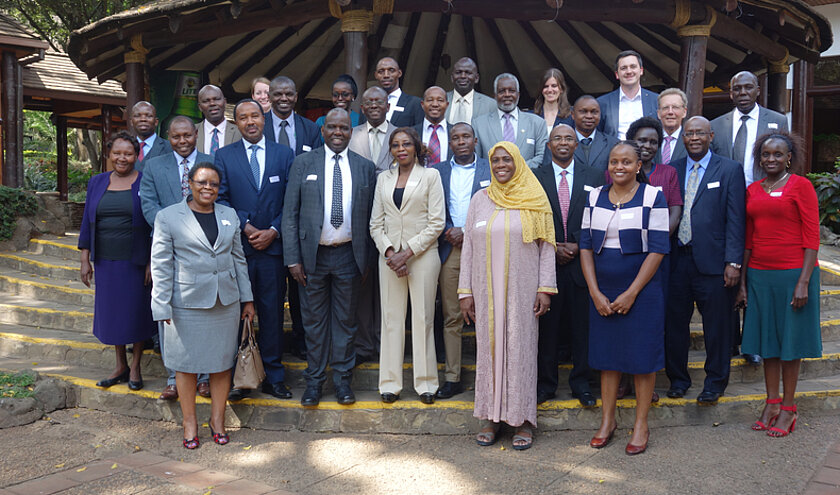University of Applied Sciences Kenya
East Africa Network of Excellence for Universities of Applied Sciences (UAS)
The demand on the Kenyan labour market for qualified specialists with practice-oriented degrees has been increasing for years. Introducing elements of application-oriented teaching, applied research, and closer collaboration between university and industry into the Kenyan higher education system may be a solution to that challenge. Germany's universities of applied sciences have implemented these characteristics of practical orientation for many years.
The main objective of this programme sponsored by DAAD and the German Foreign Office is to familiarize interested Kenyan universities, academics, and junior academics with the teaching practices at universities of applied sciences. The programme has provided the foundation for sustainable networks for "Applied Sciences" higher education partnerships between Germany and Kenya.
Project description
The main goal was to give interested Kenyan university lecturers the opportunity to gain in-depth knowledge of the model of German universities of applied sciences.
The two German universities, Hochschule Neu-Ulm (HNU) and Technische Hochschule Ingolstadt (THI), are following an application-oriented scientific approach, which focuses on the requirements in practice and qualifies students for the labour market. By integrating internship modules in companies in their curricula, the applied study programmes are less concentrated around the scientific-theoretical background.
Within this framework, the project of HNU and THI achieved the following objectives by 2019:
- Kenyan university teachers and junior academics gain in-depth knowledge of the model of the German University of Applied Sciences (UAS)
- Personal and institutional contacts between Kenya and Germany are reinforced and established
- Kenyan university teachers and junior academics are able to design and deliver teaching activities based on the model of the German University of Applied Sciences (UAS), adapted to Kenyan requirements
- Intercultural understanding is strengthened on both sides
The programme ran until end of 2019 with visits, workshops and guest lectureships in Neu-Ulm and Ingolstadt, Germany.
Building on these program objectives, HNU and THI pursued the following specific project goals:
- The qualification objectives should cover both, business management as well as technical-engineering. For this purpose, HNU and THI pool their expertise in the area of business administration and engineering sciences / technology and cover the specific features of both disciplines in the qualification measures. THI will cover especially the field of renewable energies in this project.
- The qualification measures should not just provide application-oriented teaching but also the elements of application-oriented research and knowledge & technology transfer. Application-oriented research and research-based learning are key elements for the German UAS and are depending on each other. The university and the regional anchoring of the universities with companies and diverse interest groups are central goals of a transfer strategy for German UAS.
- Another important goal of the project is the sustainability of the qualification measures. Therefore it should not only be a transmission of the German UAS system but also enable the participants to generate individual concepts to introduce concepts for UAS in their Universities. Therefore specific transfer workshops at the end of the two years program are planned.
- Finally a platform will be established, where experiences with the UAS model can be discussed and best practice can be exchanged, to intensify the personnel and institutional contacts between Germany and Kenya, and to strengthen a network between the participants.
The project was divided into three phases: initiation, qualification and transfer.
a) Initiation
17 participants from different Kenyan universities were selected in a competitive application process.
b) Qualification
This phase included the qualification of selected Kenyan university teachers through seminars and short-term stays in Germany to convey the three pillars of the model of German universities of applied sciences (UAS). In order to promote this model in Kenya’s higher education sector, HNU and THI offered three workshops in application-oriented teaching, applied research, and knowledge and technology transfer.
Other measures in this phase included short-term stays in Germany for Kenyan university teachers as well as for administrative staff. The main focus wason employees from the library, internship and career center.
c) Transfer
The transfer phase is an important factor for the qualification program to ensure sustainability and to create a collaborative network, to share and discuss about concepts, experiences and best practices in the introduction of essential elements in the German model of applied sciences.
In this phase the participants developed first ideas for the introduction of the UAS model at Kenyan universities. The transfer was supported by two workshops, to which the university management and external stakeholders from ministries and employers' associations were invited.
At the end a collaborative online platform was set up, in order to enable the participants to have furthe rexchange of ideas and to support each other in the implementation of measures beyond the end of the project: www.uas-excellence.de (opens in a new window)
Participants
17 lecturers from the following Kenyan universities completed the programme:
![[Translate to English:] group picture of the project members during the kick-off workshop in Nairobi](/fileadmin/_processed_/5/1/csm_Kick_off_HAW_Kenia_5cf96055cd.jpg)
Project team
funded by the DAAD with financial means of the German Federal Foreign Office







